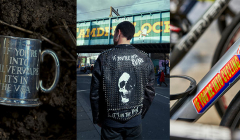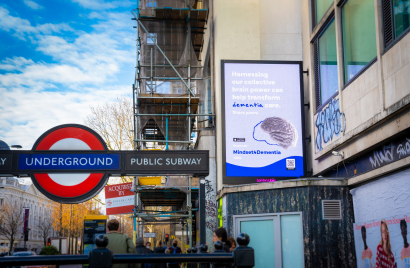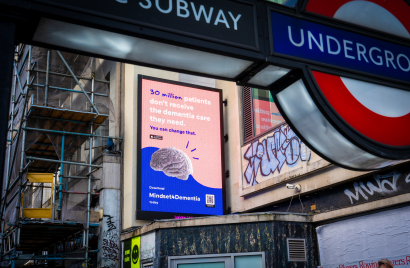
Digital creativity used to feel like an oxymoron. Not anymore
Beyond performance, digital marketing can boost engagement and channel creativity

A new campaign from Mindset4Dementia reflects the experience of people living with dementia, often in plain sight, but unseen. Hamzah Selim, Founder of Mindset4Dementia is out to change that.

Over 850,000 people in the UK live with dementia, and that number is predicted to triple by 2050. But though this is high, it’s unlikely to seem surprising to anyone reading, because a large number of people will have encountered dementia, either directly, or by knowing somebody affected through one of their friends, relatives or colleagues. And the UK isn’t unusual in this respect: according to the World Health Organisation, there are 46 million people globally now living with dementia.
Despite the ubiquity of dementia, the people living with it often go unseen or ignored. People with dementia, 62% of whom are undiagnosed, have a much higher risk of becoming withdrawn or socially isolated than their counterparts without it. The pandemic has been especially hard on them: people living with dementia make up one in every five COVID deaths, and during the first two months of the pandemic, more than double the number of people with dementia died than they did in previous years.
Self-isolation and social distancing have aggravated the characteristic dangers of living with the disease, and critical elements of medical care, from visitations from family members to symptomatic support, have been limited. In fact, patient prognoses have deteriorated to such a point that the Alzheimer’s Society says one in three people with dementia feel like ‘giving up’.
What we’re doing is giving agency back to people living with dementia by handing them the means to take charge of their own health.
Hamzah Selim
The billboard campaign we put together recently with the amazing creative support and guidance of Amplify was designed to turn a spotlight on the trials faced by people with dementia at this moment. Because so much of the country is stuck indoors, and city centres have been emptied out, the billboard ads that went up in London, Manchester, Birmingham and Newcastle reflect the experience of people living with dementia. They visibly demand the attention of any passing person, but they might as well be invisible, since there’s no one around to look.
But these ads are also representative of our solution. They’re vibrant, they’re colourful and they’re positive, because though there is no known cure for dementia, early diagnosis and management, the simple knowledge that there is something that can be done, makes a world of difference to people who have dementia and those who care for them.
This understanding is what underpins Mindset4Dementia: our powerful, compassionate, user-friendly app that screens for the signs and symptoms of dementia through smartphone technology. Dementia care doesn’t have to be clinical or grey, as it is so often portrayed.
The main idea that lies behind this campaign is that we want to encourage as many people as possible to join our fight against dementia. The launch of the app coincided with our launch of the largest-ever data-driven AI dementia initiative, which involves asking people to download the app and spend just a few minutes using it. This makes the AI better at recognising the signs and symptoms of dementia, which means every single individual contribution counts.
Mindset4Dementia is therefore a genuinely community-powered project, in that it would be impossible without the involvement of others. The National Health Service gave us a model of outstanding compassionate patient care that we’ve built into the app. Now, we’re asking the nation to give us the information needed to make the app as powerful as it can possibly be. The result is a better outcome for each person living with dementia, and, for each user, the feeling of knowing you joined the fight against dementia and made a difference.
This year has shown how things can change when people make a concerted effort, and how technology can improve lives.
Hamzah Selim
But what we’re also determined to do at Mindset and through this campaign is to have an overdue confrontation with the assumptions and stigma that surround a diagnosis of dementia. Many MedTech organisations condemn people living with dementia to be victims of the disease, forcing them into a lopsided dynamic in which people have no power.
What we’re doing is giving agency back to people living with dementia by handing them the means to take charge of their own health. We’re reaching people, in the comfort of their homes, and letting them know that they’re not alone, and that they have the power to take control of their lives.
Beyond the immediate impact that we’re trying to make on individual lives, then, is a desire for real cultural change in how we talk about, think about, and treat dementia. That might seem ambitious. But if nothing else, this year has shown how things can change when people make a concerted effort, and how technology can improve lives.


Hamzah Selim is the Founder of Mindset4Dementia, an app that uses AI to screen for early-stage dementia. A doctor in training at University College London, he and Co-Founder Itai Palmon lead a team of young NHS professionals pioneering this new technology. It was while studying that Hamzah saw the barriers to care that people living with dementia face. He resolved to combine technology and compassion to improve outcomes. With the support of the public through its data-gathering initiative, Mindset is giving people living with dementia the ability to take charge of their own health.
Looks like you need to create a Creativebrief account to perform this action.
Create account Sign inLooks like you need to create a Creativebrief account to perform this action.
Create account Sign in